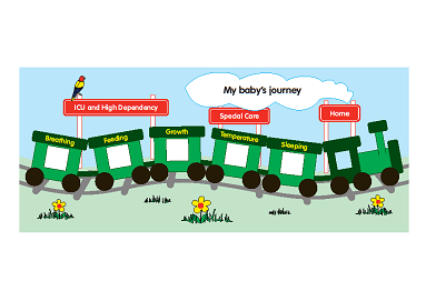Preparing for home study
Leads: Professor Peter Fleming, Dr Jenny Ingram
Co-applicants: Dr Peter Blair (Bristol),Professor Jane Powell (UWE), Dr Sarah Manns (UWE), Dr Maggie Redshaw (Oxford), Professor David Pontin (Glamorgan), Dr Sarah Wain and Kay Pullen (UHBristol Trust), Dr Claire Rose and Heather Burden (North Bristol Trust).
Collaborators: Dr Christopher Barnes (Derby); Barbara Gaal, (Ontario, Canada).
April 2016 - study update
The study has been completed, the report published in the NIHR HS&DR journal series and the main findings published in the BMJ. Two further papers have been submitted to journals.
The study materials have been updated and are now available for all neonatal units to use on the SW Neonatal Network website. There is also a self-directed training package to help staff to use the materials effectively.
A parent-centred neonatal discharge package to support families
Parents need confidence in their abilities to care for their premature babies at home. The ‘Preparing for Home’ research study provides a focal point around which planning for discharge to home can be discussed, and consists of a teaching aide in the form of a parent-focused neonatal train-to-home and gestational age appropriate care pathway. We anticipated that parental confidence in caring for their baby might reduce the length of time that babies’ stay in hospital and facilitate reduced use of other health services.
What we found
Parents were overwhelmingly positive about the Train-to-Home. They reported that the Train-to-Home improved understanding of their baby’s progress and their preparedness for discharge. Medical and nursing staff general agreed that the intervention materials were helpful in explaining a baby’s progress to parents, but some nursing staff had concerns that estimated discharge dates were too optimistic
There was no significant change in self efficacy scores after implementation of the Train-to-Home, but the number of post-discharge visits to Emergency Departments (ED) fell from 31 to 20 (p<0.05), with a significant reduction in associated healthcare costs (£3400 to £2200; p< 0.05) after discharge. In both study phases over 50% of infants went home more than 3 weeks before their EDD, though no reduction in length of stay occurred.
Preparing for Home Study 
What is this project about?
We were interested in finding out how parents feel about caring for their premature baby when they are in a neonatal unit and after they have gone home with their baby. We also collected some information about the contact the family have with health services once they are at home with their baby.
What are the benefits?
Participation from families who have had a premature baby (born between 27 and 33 weeks gestation) helped us to understand how parents feel when they have a baby in a neonatal unit and then take their baby home, to enable us to provide information to continue to improve care.
The specific benefits include an increase in parents’ confidence to manage problems and illnesses that arise at home; and reducing the number of babies who have unplanned hospital visits and attendance at emergency departments.
Why did we need the study?
The survival of premature babies has improved significantly over recent years. This improved survival has resulted in more babies being admitted to neonatal care units each year. Parents need to be prepared and supported for the time when they take their baby home. Giving them a realistic picture of how their baby is progressing, rather than one that is influenced by short term changes in infant conditions, requires staff who are well trained in the use of a family-centred pathway approach.
What did the study aim to do?
The aim of the study was to look at whether or not the introduction of a parent-centred neonatal discharge package could increase parental confidence in caring for their baby, reduce the length of stay of babies in neonatal care and reduce the use and cost of health care.
This study took place from August 2012 to April 2015. There were three phases: phase 1 recruited families to understand how confident they felt before any intervention took place; an interim phase included staff training in the hospitals on how to use the parent-centred neonatal discharge package; and finally phase 2 recruited families after the Train-to-Home was being used in the units.
Where is the research being done?
The four participating hospitals were Great Western Hospital, Swindon; Royal United Hospital, Bath; Musgrove Park Hospital, Taunton; and Royal Devon & Exeter Hospital,Exeter.
How is the research funded?
The study was funded by the National Institute of Health Research (NIHR), Health Service and Delivery Research programme.
